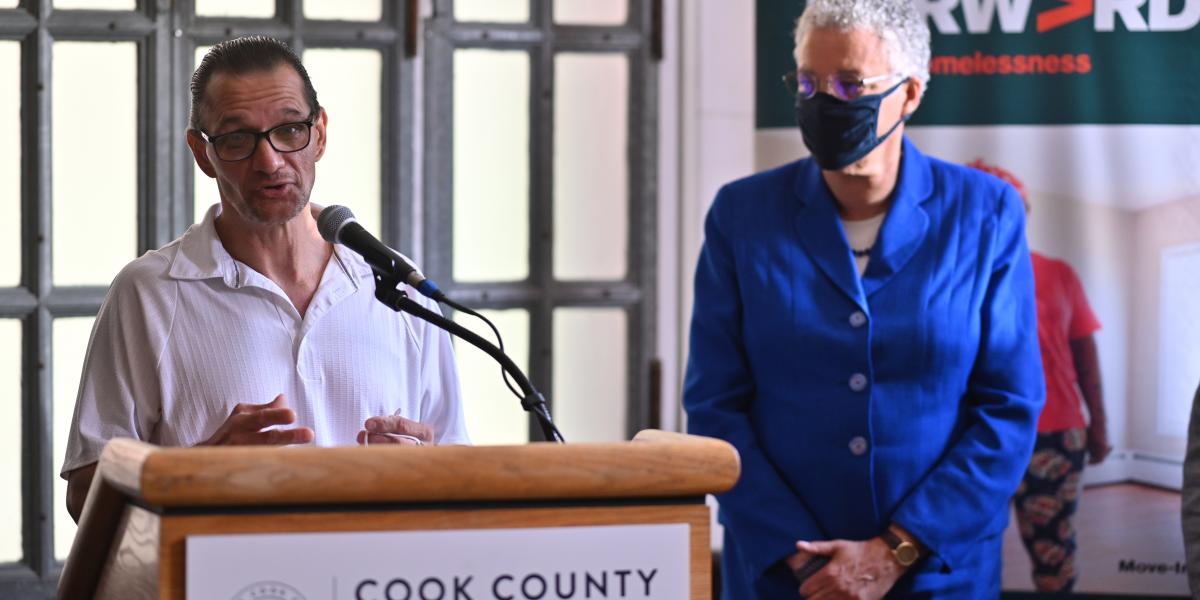
Housing Forward's Medical Respite Center Highlighted in Cook County Press Conference
On Wednesday, September 1st, Cook County Health and Housing Forward hosted a press conference to present our Medical Respite Center in Oak Park. Speakers included Toni Preckwickle, Cook County board president, Christine Haley, director of housing for Cook County Health, Lynda Schueler, executive director, Housing Forward, Dominic Tocci, deputy director of community development, Cook County Bureau of Economic Development, and Duane, a Housing Forward Medical Respite Center client.
The Medical Respite Center is housed on one full floor of a former small hotel which Housing Forward leased to create a new Interim Housing Program. This move was a response to the challenges of sheltering the homeless due to the COVID-19 pandemic. The Center has beds for up to 19 patients at one time and has served 70 individuals in the 8 months since it opened last December.
President Preckwinkle stated, “Access to safe, quality affordable housing is one of the most important social determinates of health. Individuals and families who live in problematic housing can experience an array of negative health outcomes.”
Christine Haley shared, “I am grateful for the continued partnership with Housing Forward to help provide a dignified and safe recovery space for all of our patients,” and later said, “the average age of death of an individual experiencing homelessness is 51 years. We must work to end this disparity.” The disparity is a direct result of a figurative revolving door from emergency room to the streets and back again because of recurring health care needs.
Lynda Schueler added, “Individuals and families experiencing homelessness are much more likely to have pre-existing medical conditions, weakened immune systems, and acute infections due to delayed care and thus find themselves stuck in this revolving door. A discharge to a medical respite program is the safe and positive alternative to returning people back to the streets after a hospitalization.”
Schueler also shared, “Homelessness is solvable when collaborations are formed across sectors to break down systemic barriers that can perpetuate homelessness. Health systems are one of those sectors that can play a major role in ending homelessness.”
This idea was echoed by Dominic Tocci, who said, “When the County received an infusion of federal [COVID-19] funding, we used it to continue supporting those facing homelessness…by supporting…places like this across suburban Cook County and providing increased funding to help get those facing homelessness back into permanent housing. This project is an excellent example of the impact we’re making by working collaboratively.”
Duane, a client in the Medical Respite Center, shared his experience , “It’s been a long journey for me,” he opened. “I sustained a burn while living on the street.” Duane was transferred to Stroger Hospital’s burn unit where he was treated with a skin graft before being referred to the Housing Forward housing program for medical patients. “My main concern was getting an infection,” said Duane. “It’s a real need for me to have someplace to call home and not have to return to the streets…and maybe not make it the next time around.”
Clients in medical respite receive accommodations, meals, and medical care while they recuperate with a long-term goal of finding permanent housing when they are able to care for themselves.On Wednesday, September 1st, Cook County Health and Housing Forward hosted a press conference to present our Medical Respite Center in Oak Park. Speakers included Toni Preckwickle, Cook County board president, Christine Haley, director of housing for Cook County Health, Lynda Schueler, executive director, Housing Forward, Dominic Tocci, deputy director of community development, Cook County Bureau of Economic Development, and Duane, a Housing Forward Medical Respite Center client.
The Medical Respite Center is housed on one full floor of a former small hotel which Housing Forward leased to create a new Interim Housing Program. This move was a response to the challenges of sheltering the homeless due to the COVID-19 pandemic. The Center has beds for up to 19 patients at one time and has served 70 individuals in the 8 months since it opened last December.
President Preckwinkle stated, “Access to safe, quality affordable housing is one of the most important social determinates of health. Individuals and families who live in problematic housing can experience an array of negative health outcomes.”
Christine Haley shared, “I am grateful for the continued partnership with Housing Forward to help provide a dignified and safe recovery space for all of our patients,” and later said, “the average age of death of an individual experiencing homelessness is 51 years. We must work to end this disparity.” The disparity is a direct result of a figurative revolving door from emergency room to the streets and back again because of recurring health care needs.
Lynda Schueler added, “Individuals and families experiencing homelessness are much more likely to have pre-existing medical conditions, weakened immune systems, and acute infections due to delayed care and thus find themselves stuck in this revolving door. A discharge to a medical respite program is the safe and positive alternative to returning people back to the streets after a hospitalization.”
Schueler also shared, “Homelessness is solvable when collaborations are formed across sectors to break down systemic barriers that can perpetuate homelessness. Health systems are one of those sectors that can play a major role in ending homelessness.”
This idea was echoed by Dominic Tocci, who said, “When the County received an infusion of federal [COVID-19] funding, we used it to continue supporting those facing homelessness…by supporting…places like this across suburban Cook County and providing increased funding to help get those facing homelessness back into permanent housing. This project is an excellent example of the impact we’re making by working collaboratively.”
Duane, a client in the Medical Respite Center, shared his experience , “It’s been a long journey for me,” he opened. “I sustained a burn while living on the street.” Duane was transferred to Stroger Hospital’s burn unit where he was treated with a skin graft before being referred to the Housing Forward housing program for medical patients. “My main concern was getting an infection,” said Duane. “It’s a real need for me to have someplace to call home and not have to return to the streets…and maybe not make it the next time around.”
Clients in medical respite receive accommodations, meals, and medical care while they recuperate with a long-term goal of finding permanent housing when they are able to care for themselves.
For Media Inquiries Contact
Libby Foster
lfoster@housingforward.org
708.338.1724 ext 211



